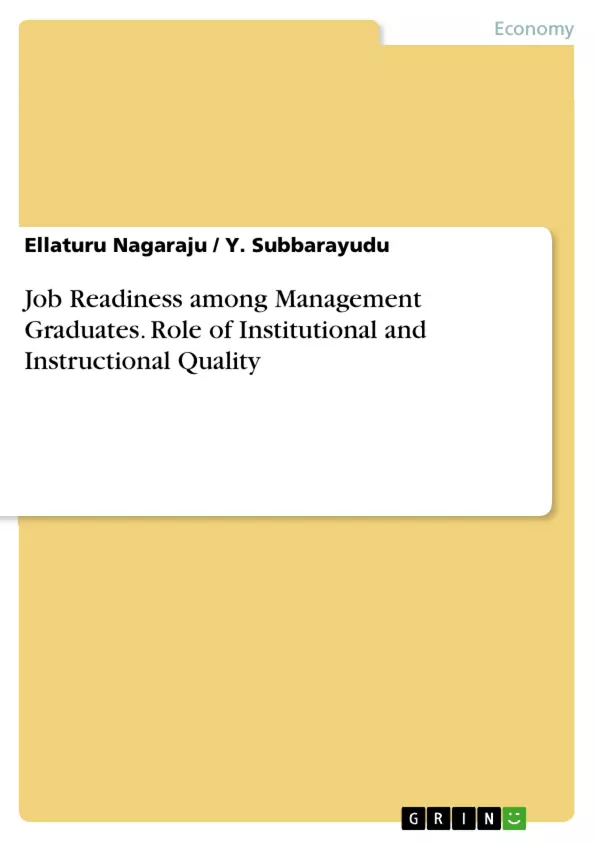The educational institutions are supposed to facilitate required facilities like libraries, laboratories, advanced teaching and practical job-related facilities to the students. Teacher abilities and expertise in inspiring and motivating the student to achieve better outcomes is the next important aspect to be looked upon. Teachers are supposed to instruct and direct the students to perform qualitatively in the academics and in attaining the jobs. And finally, the student personal characteristics like self-interest, career aspiration, engagement and involvement are also important to achieve better results. As Indian higher educational institutes, more particularly the Management colleges in private sector, are poor in these lines, students are not getting equipped properly and placed in the industries to the extent it actually needs. Hence, the present study has been taken up to develop the scales for measuring the institutional and instructional quality of the teachers and assessing the impact of these factors on the student satisfaction and engagement which may lead to job readiness of the student.
The study adopted purposive sampling technique for data collection from the student respondents connected to various MBA colleges in the state of Andhra Pradesh. The data were anlayzed using suitable statistical techniques like Structural Equation Modeling with help of SPSS, AMOS, and jamovi. The results have showed that the student job readiness is possible through Institutional quality, teacher instructional quality and student factors like satisfaction and engagement. Based on these five constructs, the study proposed a Research conceptual model with direct and indirect relationships of institutional quality and instructional quality on student job readiness. To predict the student job readiness, the researcher developed two scales namely, HiEdInstaQual and InstructQual by identifying the student perceived institutional quality and instructional quality measuring factors with the support of literature and expert suggestions.
In order to improve student job readiness, it is required to improve the teacher instructional quality and inspire the student to be engaged in academic activities. The proposed research model can be applied in any educational research studies in the context of predicting student job readiness from student perspective. The stakeholders like colleges, students, teachers, policy makers and industries may focus on these aspects.
Inhaltsverzeichnis (Table of Contents)
- Preface
- Acknowledgements
- Chapter 1: Introduction
- Background
- Statement of the Problem
- Objectives of the Study
- Scope of the Study
- Hypotheses of the Study
- Significance of the Study
- Limitations of the Study
- Chapter 2: Review of Literature
- Chapter 3: Research Methodology
- Research Design
- Population and Sample
- Sampling Technique
- Data Collection Instrument
- Data Analysis Technique
- Chapter 4: Data Analysis and Interpretation
- Analysis of Institutional Quality
- Analysis of Instructional Quality
- Analysis of Student Satisfaction and Engagement
- Analysis of Job Readiness of Management Graduates
- Chapter 5: Findings, Discussion, and Conclusions
- Findings of the Study
- Discussion of the Findings
- Conclusions
- Suggestions for Future Research
- Bibliography
Zielsetzung und Themenschwerpunkte (Objectives and Key Themes)
This book aims to examine the relationship between institutional and instructional quality and job readiness among management graduates in India. It aims to develop scales for measuring these factors and assess their impact on student satisfaction and engagement, which contribute to job readiness. The research focuses on private management colleges in Andhra Pradesh, a region with significant growth in private institutions.
- The role of institutional quality in facilitating job readiness
- The influence of instructional quality on student outcomes
- The relationship between student satisfaction, engagement, and job readiness
- The impact of private management institutions on the Indian education landscape
- Developing methodologies for measuring and improving job readiness among management graduates
Zusammenfassung der Kapitel (Chapter Summaries)
The book begins with an introduction outlining the research problem, objectives, and scope of the study. It explores the challenges of job readiness in India's rapidly evolving education system. Chapter 2 presents a comprehensive review of relevant literature, discussing existing research on institutional quality, instructional quality, student satisfaction, and job readiness in the context of management education. Chapter 3 delves into the research methodology, detailing the research design, population and sample, data collection methods, and analysis techniques. Chapter 4 provides a thorough analysis of the collected data, examining the relationship between institutional and instructional quality, student satisfaction and engagement, and job readiness. The chapter explores the findings through detailed data analysis and interpretation.
Schlüsselwörter (Keywords)
Key keywords include: job readiness, management graduates, institutional quality, instructional quality, student satisfaction, engagement, private management institutions, higher education in India, Andhra Pradesh, research methodology, data analysis, empirical research.
Frequently Asked Questions
How does institutional quality affect job readiness?
Institutional quality, including facilities like libraries and laboratories, provides the necessary environment for students to acquire practical skills required by the industry.
What role do teachers play in making graduates job-ready?
Instructional quality—the ability of teachers to inspire, motivate, and direct students—is crucial for academic performance and successful job placement.
What is the "HiEdInstaQual" scale?
It is a measurement scale developed in the study to assess student-perceived institutional quality in higher education settings.
Why are private management colleges in India struggling with placements?
Many private colleges lack advanced teaching facilities and industry-aligned instruction, leading to a gap between student skills and industry needs.
What personal factors contribute to a student's job readiness?
A student's self-interest, career aspirations, and level of engagement in academic activities are significant predictors of their readiness for the workforce.
- Citation du texte
- Dr. Ellaturu Nagaraju (Auteur), Dr. Y. Subbarayudu (Auteur), 2021, Job Readiness among Management Graduates. Role of Institutional and Instructional Quality, Munich, GRIN Verlag, https://www.grin.com/document/1239314



